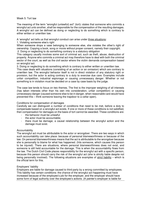Summary
Summary Business Organisation & Law, chapter 5
- Course
- Institution
The meaning of the term “wrongful (unlawful) act” (tort): states that someone who commits a wrongful act unto another, shall be responsible for the compensation of the resulting damages. A wrongful act can be defined as doing or neglecting to do something which is contrary to either written or ...
[Show more]



